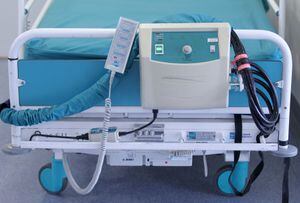Hospital bed-blocking down across Black Country and Staffordshire
Hospital bed-blocking has fallen across parts of the Black Country and Staffordshire, reaching its lowest level in years.

The UK-wide problem of patients continuing to occupy a hospital bed despite being well enough to be discharged home – called delayed transfers of care – has been reduced in Wolverhampton by more than 70 per cent in the past two years.
The latest survey shows that just four city residents in every 100,000 were blocking beds on any given day in April 2019, down from more than 14 two years ago.
The national average is 10 residents per 100,000 of the adult population, with the average in the West Midlands being 10.8.
It means Wolverhampton was the 18th best performing health and social care system in April 2019, a huge improvement on their 104th position in April 2017.
Meanwhile, Sandwell was the top performing council across the country in May, with the number of ‘delayed days’ for residents being discharged from hospital being 31 per 100,000 people.
The average delay across all English councils was more than 10 times that at 317.
And the number of patients in hospital unnecessarily in Staffordshire has fallen by more than 40 per cent in the last 12 months, figures have shown.
In May the figure for Staffordshire patients was 2,714. This compares to 4,754 in March 2018, with figures around the 4,000 mark until summer of last year.
'Excellent news'
Heather Johnstone, Staffordshire and Stoke-on-Trent CCG’s Director of Quality and Nursing said: “This is excellent news for our patients, for the NHS and for the partners we work with in Local Authorities.
“This is really about getting people safely and promptly out of hospital, to a place where they are best placed to be supported, whether it’s their own home, a care home or hospice. This is overwhelmingly in the best interest of patients.
“It also means more hospital beds are available for people who really need to be there.
“The validated figures mean that we have reached our national target for the first time for Staffordshire patients.
"The main challenge has been “repatriating” patients from Staffordshire who are being treated in hospitals outside the county or Stoke-on-Trent.”
Relief
Councillor Farut Shaeen, Sandwell Council’s cabinet member for living healthy lives, said: “It’s always a relief to get back home after being in hospital so any delay to that can be a very difficult and distressing. Not only that, it can have an effect on a patient’s mobility and independence.
“That’s particularly the case with older people, who may need a care package set up or adaptations in their home to make sure they’re safe when they leave hospital.
“We work really hard with our partners to make sure people aren’t spending unnecessary time in hospital and freeing up those beds for the next patient.”
A delayed transfer of care occurs when a patient is deemed fit to leave hospital but is delayed because of social care arrangements that need to be put in place for when they return home, often causing distress to them and preventing new patients from being admitted.
Councillor Linda Leach, cabinet member for adult services, said: “Over the last two years we and our partners have really focused our efforts on the issue of delayed transfers of care – and these latest figures show that all our hard work is beginning to bear fruit.
“Once it is safe for a patient to be discharged from hospital it is to everyone’s benefit that this is done so as quickly as possible.
" A few years ago, Wolverhampton was not where we would want it to be, but now it is in the top quartile nationally, and has been since January.
“This is good news for patients who are able to return to the comfort of their own home more quickly once their treatment in hospital has ended; it is also helping other patients who are benefitting from reduced waiting times for a bed because they can be freed up more quickly.”
Hospital bed-blocking in Wolverhampton has fallen dramatically – reaching its lowest level in several years, new figures show.
The UK-wide problem of patients well enough to be discharged home continuing to occupy a hospital bed – called delayed transfers of care – has been reduced in Wolverhampton by more than 70 per cent in the past two years.
The latest survey shows that just four city residents in every 100,000 were blocking beds on any given day in April 2019 – down from more than 14 two years ago.
The national average is 10 residents per 100,000 of the adult population, with the average in the West Midlands being 10.8.
It means Wolverhampton was the 18th best performing health and social care system in April 2019 – a huge improvement on their 104th position in April 2017
A delayed transfer of care occurs when a patient is deemed fit to leave hospital but is delayed because of social care arrangements that need to be put in place for when they return home, often causing distress to them and preventing new patients from being admitted.
The turnaround has been credited to the joining up of local health and social care services and the development of new services by Wolverhampton Council, Wolverhampton Clinical Commissioning Group and the Royal Wolverhampton NHS Trust.
These include a new process which sees patients assessed at home, rather than hospital. Resources have also been pooled aimed at minimising hospital stays and maximising independence, such as helping people regain skills they may have lost during their time in hospital.
The move has also cut the number of unnecessary hospital admissions in the first place by increasing the number of people using Telecare assistive technology to help them live independently for longer in their own homes.
Councillor Linda Leach, cabinet member for adult services, said: "Over the last two years we and our partners have really focused our efforts on the issue of delayed transfers of care – and these latest figures show that all our hard work is beginning to bear fruit.
"Once it is safe for a patient to be discharged from hospital it is to everyone’s benefit that this is done so as quickly as possible. A few years ago, Wolverhampton was not where we would want it to be, but now it is in the top quartile nationally, and has been since January.
"This is good news for patients who are able to return to the comfort of their own home more quickly once their treatment in hospital has ended; it is also helping other patients who are benefitting from reduced waiting times for a bed because they can be freed up more quickly."
David Loughton, chief executive of the Royal Wolverhampton NHS Trust, said: “Working in partnership benefits patients and staff alike. This combined focus has enabled more patients to receive care and support when they need it, reducing delays. The integrated approach is invaluable.”





